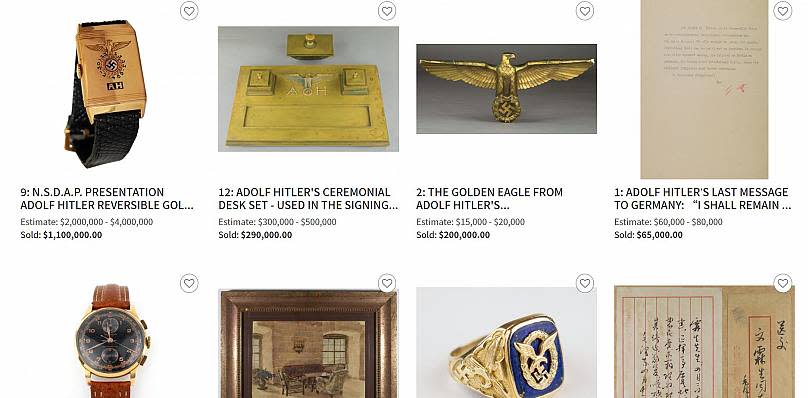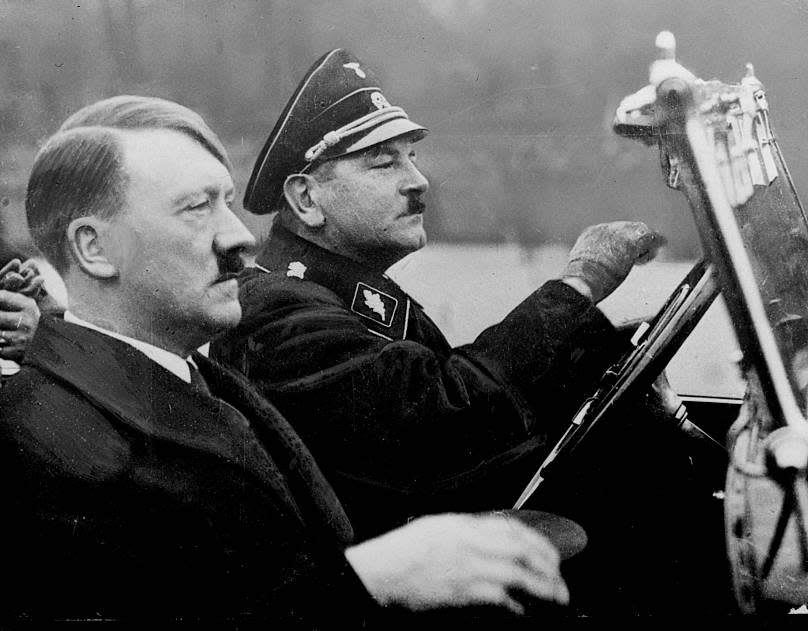Nazi Memorabilia: why did someone just buy Hitler's watch?

One of Adolf Hitler’s watches has just fetched over a million dollars in a private auction.
The watch was sold by Alexander Historical Auctions in Maryland for $1.1 million (€1.07 million) to an anonymous bidder, and is believed to be a gift, given to Hitler for his 44th birthday on 20 April 1933.
The Andreas Huber reversible watch is engraved with three dates around a Swastika - Hitler’s birth date, the date he became Chancellor and the day the Nazi party won the election in March 1933.
At the end of the Second World War, a French soldier seized the watch from Hitler’s Berchtesgaden retreat in south-eastern Germany.
Nazi memorabillia auction houses
Alexander Historical Auctions specialise in military history and this isn’t the first auction to have Nazi paraphernalia on sale.
They have auctioned other controversial items that belonged to Hitler, including a dog collar, toilet paper, cutlery, and champagne glasses.
Other Nazi memorabilia included medals, letters, guns, military clothes, and even some of Hitler’s paintings.
The watch was the item that sold for the highest price, but many other pieces collected tens of thousands of dollars.

The market for Nazi memorabilia is a complex one. In Germany, Austria and France for example, it is illegal to sell Nazi “collectibles”. But those same restrictions don’t extend to the UK and the US.
Many of the major auction houses, including Christie’s, Sotheby’s and Bonham’s refuse to sell items related to Nazi Germany.
When Bloomfield Auctions in Belfast put a Nazi tablecloth up for auction in 2019, the backlash caused them to remove the item and change their policy around Nazi memorabilia.
There are also bans on Nazi-related items being sold on eBay as part of its “Offensive materials policy”.
Community backlash
When the smaller auction houses do put Nazi memorabilia on sale, there is regular criticism from the Jewish community.
After the auction of Hitler’s watch, an open letter signed by 34 Jewish leaders demanded the sale be cancelled.
“This auction, whether unwittingly or not, is doing two things: one, giving succour to those who idealise what the Nazi party stood for. Two: offering buyers the chance to titillate a guest or loved one with an item belonging to a genocidal murderer and his supporters,” said Rabbi Menachem Margolin, chairman of the Brussels-based European Jewish Association (EJA).
“The sale of these items is an abhorrence. There is little to no intrinsic historical value to the vast bulk of the lots on display. Indeed, one can only question the motivation of those buying them,” he continued.
“Whilst it is obvious that the lessons of history need to be learned – and legitimate Nazi artefacts do belong in museums or places of higher learning – the items that you are selling clearly do not. That they are sold to the highest bidder, on the open market is an indictment to our society, one in which the memory, suffering and pain of others is overridden for financial gain,” Rabbi Margolin said.
But Alexander Historical Auctions argues it is playing its part in preserving history.
“If you destroy history, there is no proof that it happened,” Mindy Greenstein, senior vice president at Alexander Historical Auctions told Deutsche Welle.
Greenstein herself lost many members of her Ukrainian Jewish family in the Holocaust.
“Whether good or bad history, it must be preserved,” she said.
Greenstein also claims that many of the acquired items are donated to Holocaust museums around the world.
The United States Holocaust Museum actively seeks out donations including medals, flags and propaganda. But they do not accept Nazi weaponry.

Who is buying?
Nazi artefact dealer Andreas Gronemann told artnet that “all of my clients are educated people, university professors, medical doctors, as well as museums such as the US Holocaust Museum, and many try to preserve this kind of material for future generations and to learn from it.”
But this doesn’t fit with the experience of Gavriel Rosenfeld, professor of history at Fairfield University in Connecticut, who paints a different picture.
“The stereotypical collector of Nazi artefacts is either a wealthy Texas oil baron with military veterans in the family tree, or neo-Nazi lunatics creating basement shrines to their historical idols,” says Rosenfeld.
This is the image that most resembles pop-culture depictions. Especially in films: from Tony Kaye’s American History X to Sam Mendes’ American Beauty, when Ricky, played by Wes Bentley, reveals his father Col. Frank Fitts (Chris Cooper), a military veteran, has a plate with a Nazi swastika on it.
Should we be worried about the continued sale of Nazi memorabilia?
If it’s any solace, although Hitler’s watch sold for over €1 million, it was expected to make four times that much.

 Yahoo News
Yahoo News 



